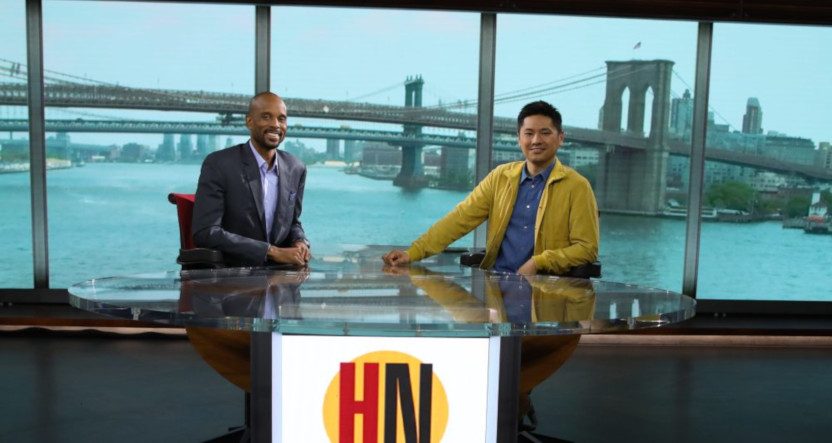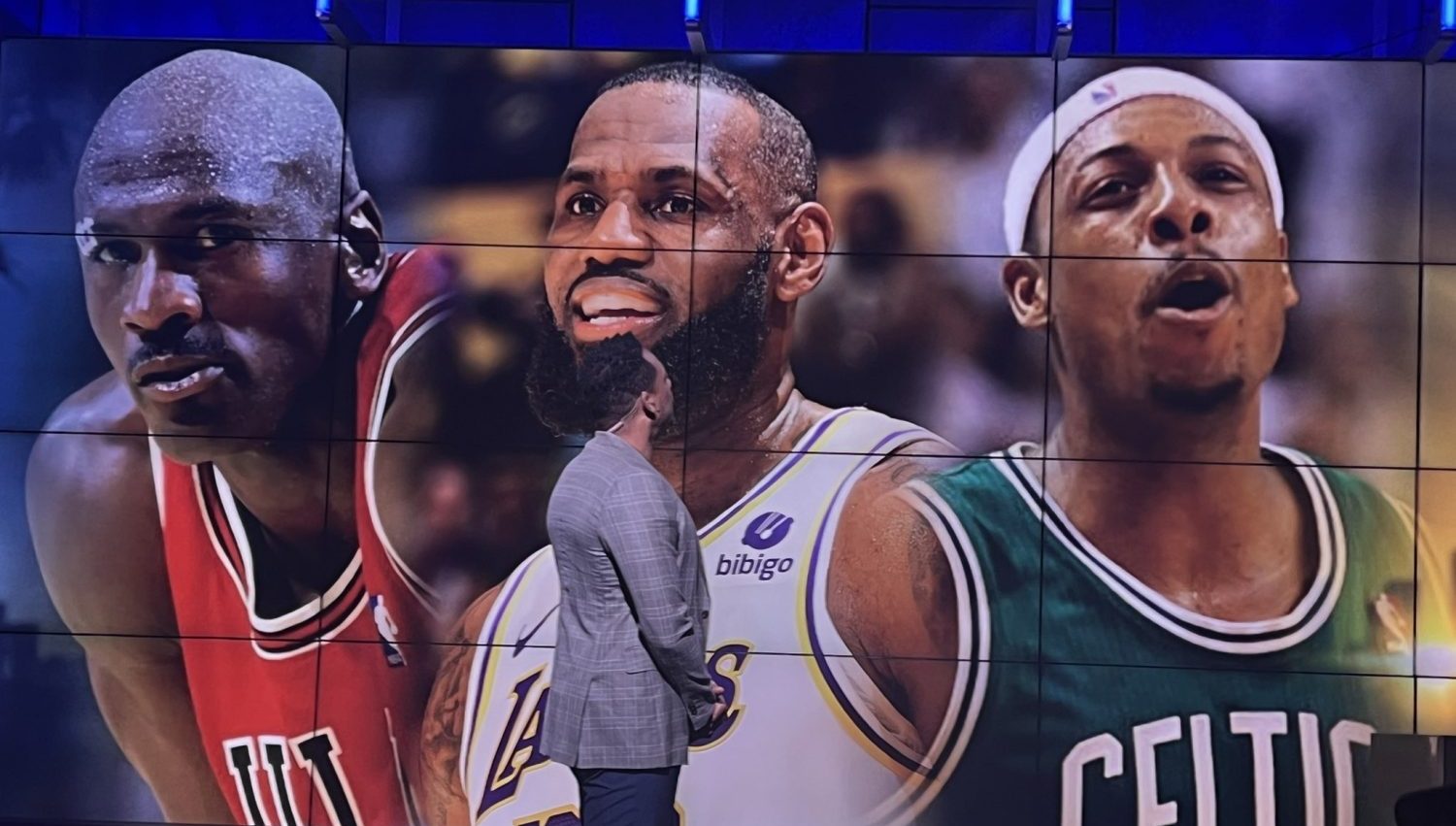In the actual sports world, there’s often discussion of athletes being capable individually, but not the right fit for a particular scheme or lineup a team is trying to deploy. We see that in football when it comes to particular traits teams are looking for in quarterbacks, pass rushers, receivers, defensive backs and more. And we see it in baseball, where a prospect’s position and a team’s depth at that position is often key to their future.
Something similar can sometimes be said for the sports media world, and maybe the sports television world in particular. There, a show’s longevity or lack thereof can be about more than ratings or its own quality, with how it fits with the network’s lineup and approach also often a key consideration. Bomani Jones discussed that in a Fortune interview published online Tuesday on where he’s at now, which includes Game Theory on HBO and the thrice-weekly The Right Time podcast for ESPN. There, he said he doesn’t view High Noon (his ESPN show with Pablo Torre, which was discussed in 2016, announced in 2017, and ran from 2018-2020) as a failure, and said even the ideal version of it wouldn’t fit in ESPN’s current lineup.
“I could have the greatest version of ‘High Noon’ that was possible, [but] there’s not a place in their line-up for that right now,” he said. “That’s just not what they do, and that has zero to do with me.”
There’s a point there, and some of that has to do with how ESPN itself changed from 2016-2020. When the idea of a Torre-Jones show was first publicly floated in October 2016 as a noon ESPN2 show, it was envisioned as a replacement for the Michael Smith-Jemele Hill His and Hers, with those two anchors moving to the 6 p.m. ET SportsCenter. But as early as February 2017, ESPN had firmly shifted ESPN2 into a network focusing on rerunning main-network programming, with the only daily original show there at that point the final hour of Dan Le Batard’s radio show.
Some further shows were launched on ESPN2 after that, including Intentional Talk (which was a MLB Network simulcast) and Barstool Van Talk. But neither of those lasted long. 2017 also saw two giant rounds of ESPN layoffs, and that contributed to decisions to focus on doing less shows and airing them across ESPN (live) and ESPN2 (rerun). So that meant when High Noon was officially announced in May 2017 and launched in June 2018, it was now a main-network ESPN show. And that comes with higher audience expectations than an ESPN2 show, and that can mean a push to go broader (and go broad from the start) than the often-quirky, discussion-oriented, less stick-to-sports programming that started on ESPN2. Of course, ESPN itself was showing some quirky things at that point, including Le Batard’s Highly Questionable (which Jones was a daily co-host on from 2013-2017 before leaving to develop High Noon). But that show got its start on ESPN2 in 2011, and built a significant following before its 2015 move to the main network.
There’s more to this than just the specific network, of course. Another aspect is the High Noon launch coming much later than expected thanks to construction delays at ESPN’s New York studios and challenges launching fellow NY-based show Get Up. High Noon was initially set for a January 2018 launch, but didn’t launch until June that year. January is a great time to launch a sports show, with the NFL playoffs, the Super Bowl, and March Madness ahead. June is rougher; yes, High Noon launched in time to cover the NBA Finals, but it then hit the summer sports doldrums (there was a FIFA World Cup that summer, but that’s not usually major ESPN studio show fodder). And before it got any chance at a football season bump (which eventually saved Get Up), the show was reduced to half an hour and moved to 4 p.m. ET in favor of a noon SportsCenter that August, meaning even its title no longer fit.
It’s worth discussing the “place in their lineup” part of that quote, too. In 2016, a show like High Noon that was more discussion (and often discussion touching on off-field topics) than First Take-style debate felt like a reasonable fit for ESPN, matching with the likes of Highly Questionable and The Dan Le Batard Show, and following what His and Hers had done. By 2018, though, there was already a shift there, emphasized by the focus and promotion ESPN put behind Get Up (which, as long maintained on this site, could be more accurately titled “Mike Greenberg’s Morning Hot Take Parade”).
And executive moves made a difference there too. The biggest may have been the December 2017 resignation of ESPN president John Skipper (who had long been a particular supporter of Le Batard and Le Batard-adjacent or -style content, which High Noon certainly was, and now has teamed with Le Batard at Meadowlark Media). That led to the March 2018 appointment of Jimmy Pitaro (who said early on “I do not believe that we are a political organization,” and who once-and-future Disney CEO Bob Iger said in September 2018 agreed that ESPN’s focus had “swung a little too far away from the field” to social and political issues).
High Noon was never the culture wars talking point that Hill and Smith’s SportsCenter was. (Whether the SC6 conversation was fair or not has received its own volumes of discussion.) But High Noon, like much of the content before and since from Jones and Torre, was definitely looking at social and political issues in addition to on-field stories. And it was definitely not providing the (sometimes theatrical) high-intensity debates that are a larger and larger ESPN focus these days (even if they’re not always enjoyed by their participants).
The beyond-the-field stories have been a declining area of emphasis for ESPN under Pitaro. And it’s notable to see how many of those interested in beyond-the-field content have left ESPN over the past several years, including Hill, Smith, Kate Fagan, Le Batard, Bob Ley, and more. And while Jones and Torre are both still contributing to ESPN, they now both have larger roles elsewhere, with Jones hosting Game Theory at HBO and Torre announcing a new Meadowlark deal this week. Some of the comments Le Batard made to Cari Champion in 2021 seem appropriate to reprint here:
“I was hired to be a fire-starter. I was hired to talk about some of the difficult stuff and the company changed and the country changed. What didn’t change is the reason I was hired and what didn’t change is that I was going to be my most authentic voice and self. We left amicably and I don’t have hard feelings toward ESPN. They helped make us bigger. It was a mutually beneficial relationship for as long as it was a mutually beneficial relationship.”
Much of that feels apt for Jones and ESPN as well. There’s still a relationship there with The Right Time, and it seems to still be mutually beneficial. Even there, though, there have been notable changes, with that podcast growing out of a Jones-instigated shift from a daily radio show. And that, like Game Theory, seems like a fit for Jones, serving as a place where he can dive into issues he cares about and where those who enjoy his approach can seek that out. But it’s notable that it’s not Jones who has changed much, but rather ESPN. And Jones’ further comments in that Fortune piece reflect that, with his discussion on how he’s tried to be consistent:
“You want to do your work in the place where it gets the most visibility so long as you can stay true to what it is that you’re doing. Because once people can sniff that you’re not being true to yourself and what you’re doing, then they don’t care about anything else. It doesn’t matter. Your credibility is gone once they don’t believe that you’re being true to you.”
And that’s really the thing here. There was a version of ESPN where High Noon made sense, and that’s why it was commissioned. But by the time it actually launched, ESPN had a new president, and was undergoing significant shifts in strategy. And a non-debate show hosted by Jones and Torre was much less of a fit than it had been before, and as Jones notes, there really would not be a place for it at ESPN at all these days. Maybe High Noon wouldn’t have gained the viewership it needed to keep going even under the old ESPN approach where it was first planned; we’ll never know. But these quotes are interesting to look at, as they provide a window into how ESPN has changed since that 2018 High Noon launch, and why Jones now has a TV show at HBO rather than ESPN.
[Fortune, Barrett Sports Media]





